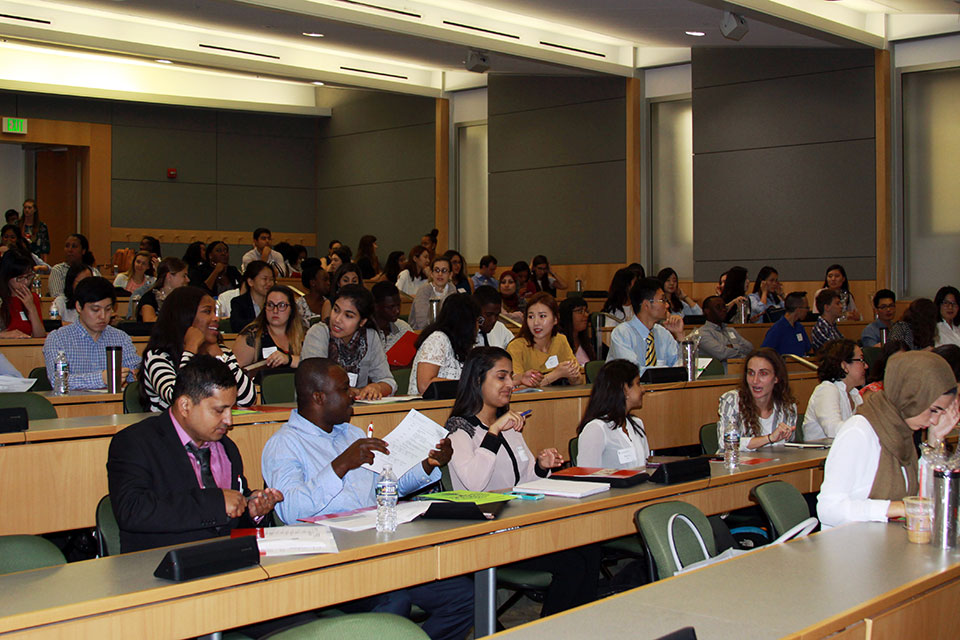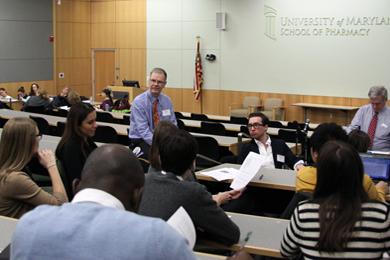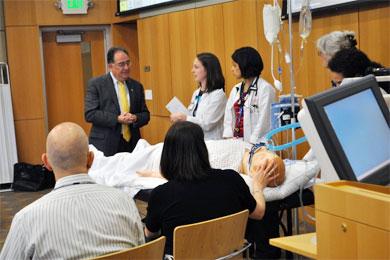SOP Faculty Present at Shady Grove’s Fourth Annual Biomedical Sciences Day
Practice and science faculty from the University of Maryland School of Pharmacy join panel of experts to discuss the interdisciplinary nature of pain management.
By Malissa Carroll
November 28, 2012
The Universities at Shady Grove, home to the University of Maryland School of Pharmacy’s Doctor of Pharmacy (PharmD) distance learning program, hosted its Fourth Annual Biomedical Sciences Day on Thursday, Nov. 15, 2012. Organized by the Committee on Collaboration, Interprofessional and Interdisciplinary Education Strategies (CIPES), this event presented a panel focused on pain management under the theme “It Takes A Village to Treat Pain.”
Two panelists at the event represented the School of Pharmacy: Mary Lynn McPherson, PharmD, BCPS, CPE, professor and vice chair of education for the Department of Pharmacy Practice and Science, and Andrew Coop, PhD, professor and chair of the Department of Pharmaceutical Sciences. Other panelists included Cynthia Renn, PhD, RN, assistant professor of organizational systems and adult health at the University of Maryland School of Nursing, and Jeffrey Petersohn, MD, associate professor of anesthesiology at Drexel University School of Medicine.
“The great thing about this panel was that a nurse, pharmacist, basic scientist, and physician were on stage at the same time,” says Coop. “The presentations really showed the spectrum needed to treat pain, both now and in the future.”
Panelists delivered lectures on a wide range of topics related to pain management, including changing pharmaceutical needs, basic science research and animal models, development of novel pain therapeutics, the perception and production of pain, and interventional approaches to treating pain.
Coop delivered the panel’s second presentation, addressing how pain killing drugs have been developed in the past, issues with them, and how new pain killers are developed today. His lecture emphasized collaboration between clinicians and basic scientists as essential to the drug development process.
McPherson presented the panel’s third lecture, which discussed cancer and non-cancer pain, including options available to manage both. She explained how to select medications that best meet the needs of the individual patient, as well as how to properly assess and document medications prescribed to patients.
“Dr. Coop referred to topics addressed by the previous presenter, I talked about issues Dr. Coop mentioned, and the physician who delivered the panel’s final presentation referenced each of the three previous presentations,” says McPherson. “I think that allowed students to really understand the continuity and the process required to manage pain effectively.”
However, both Coop and McPherson stress that an interprofessional approach to drug development and patient care is not limited only to pain management. In Fall 2011, the School of Pharmacy launched a new course for third-year student pharmacists titled “Applied Pharmaceutical Sciences.” This course provides students with the opportunity to apply knowledge and skills from the pharmaceutical, clinical, and health services sciences to real-world issues that arise in pharmacy practice and drug development.
“The Applied Pharmaceutical Sciences course teaches our students, the majority of whom are going to end up in clinical practice, why it’s still important for them as future clinicians to remember your basic science,” says McPherson.
Each semester, faculty members from the Department of Pharmaceutical Sciences and the Department of Pharmacy Practice and Science work with students to address issues in pharmacy practice, drug delivery, drug design, drug response, drug safety, and pharmacokinetics. Coop and McPherson partnered to teach one of the course’s lectures this semester.
“This course brings the interdisciplinary approach to the classroom, allowing us to talk to students about how, although they might have a specialty area, they will still need to collaborate with other health professionals along the spectrum” says Coop. “It has gone over well, not only with the students, but also the faculty.”



